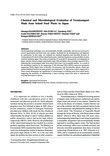Chemical and Microbiological Evaluation of Vermicompost Made from School Food Waste in Japan
Japan Agricultural Research Quarterly
| ISSN | 00213551 |
|---|---|
| NII recode ID (NCID) | AA0068709X |

Full text
jarq55-3_225-232.pdf1011.53 KB
Vermicomposting technology is an environmentally friendly, sustainable, and low-cost tool used to convert agronomical and food waste into manure, facilitated by the decomposition and digestion by earthworms. In this study, we evaluated the chemical properties and microbial diversity of vermicompost (VC) derived from school lunch waste, which has long been a serious problem in many countries including Japan. The results revealed that 18-week-old VC promoted the root elongation of plants, and also showed a higher germination index (GI) and higher cation exchange capacity (CEC), indicating that vermicompost made from school food waste is an acceptable manure. As a result of the microbiome analysis by the sequencing of 16S ribosomal DNA (rDNA) using next generation sequencing (NGS), higher ratios of Bacillus, Pseudomonas, and Paenibacillus species, which may include beneficial bacteria for plant growth, were detected in VC than in the control compost (CC). These results demonstrate the significance of vermicompost in utilizing waste from school lunch, suggesting the possibility of implementing a waste recycling system that leads to reducing and recycling food waste in schools.
| Date of issued | |
|---|---|
| Creator | Shumpei HASHIMOTO Mai FURUYA Xiaodong YOU Genki WANIBUCHI Hayato TOKUMOTO Motoaki TOJO Kumpei SHIRAGAKI |
| Subject | bacterial diversity manure microbial activity school lunch |
| Publisher | Japan International Research Center for Agricultural Sciences |
| Received Date | 2019-11-05 |
| Accepted Date | 2020-09-28 |
| Volume | 55 |
| Issue | 3 |
| spage | 225 |
| epage | 232 |
| DOI | https://doi.org/10.6090/jarq.55.225 |
| Language | eng |
